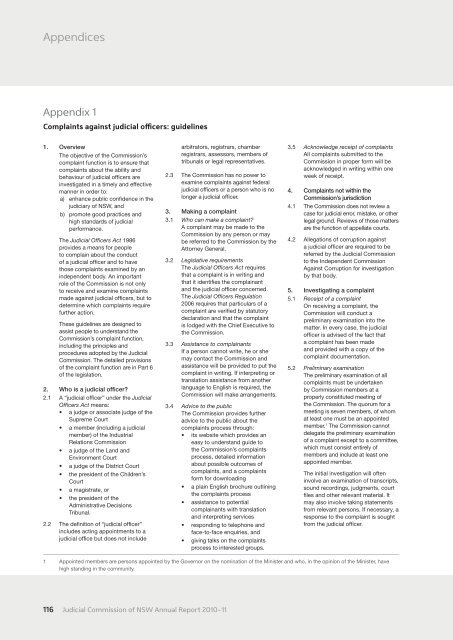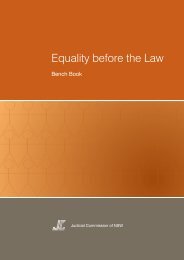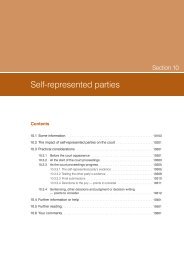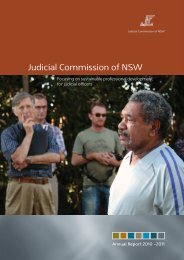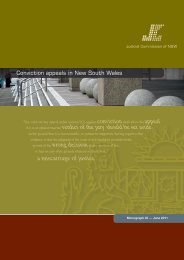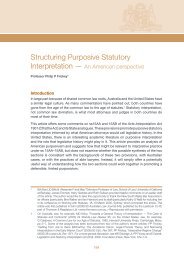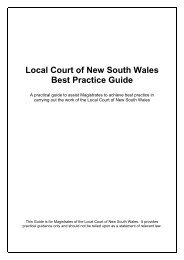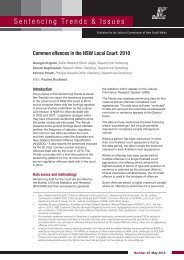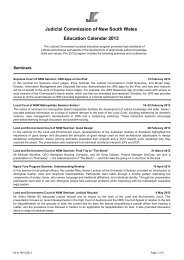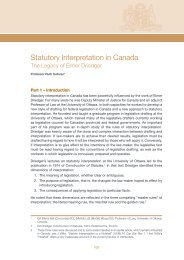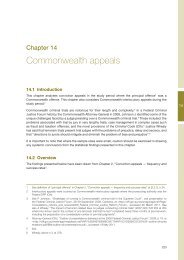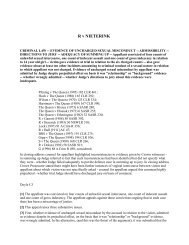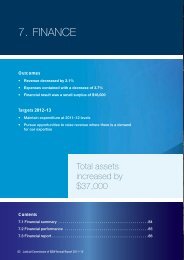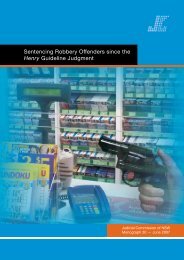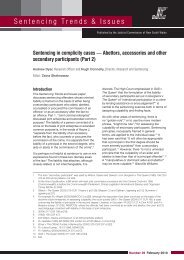Download - Judicial Commission of New South Wales - NSW ...
Download - Judicial Commission of New South Wales - NSW ...
Download - Judicial Commission of New South Wales - NSW ...
Create successful ePaper yourself
Turn your PDF publications into a flip-book with our unique Google optimized e-Paper software.
Appendices<br />
Appendix 1<br />
Complaints against judicial <strong>of</strong>ficers: guidelines<br />
1. Overview<br />
The objective <strong>of</strong> the <strong>Commission</strong>’s<br />
complaint function is to ensure that<br />
complaints about the ability and<br />
behaviour <strong>of</strong> judicial <strong>of</strong>ficers are<br />
investigated in a timely and effective<br />
manner in order to:<br />
a) enhance public confidence in the<br />
judiciary <strong>of</strong> <strong>NSW</strong>, and<br />
b) promote good practices and<br />
high standards <strong>of</strong> judicial<br />
performance.<br />
The <strong>Judicial</strong> Officers Act 1986<br />
provides a means for people<br />
to complain about the conduct<br />
<strong>of</strong> a judicial <strong>of</strong>ficer and to have<br />
those complaints examined by an<br />
independent body. An important<br />
role <strong>of</strong> the <strong>Commission</strong> is not only<br />
to receive and examine complaints<br />
made against judicial <strong>of</strong>ficers, but to<br />
determine which complaints require<br />
further action.<br />
These guidelines are designed to<br />
assist people to understand the<br />
<strong>Commission</strong>’s complaint function,<br />
including the principles and<br />
procedures adopted by the <strong>Judicial</strong><br />
<strong>Commission</strong>. The detailed provisions<br />
<strong>of</strong> the complaint function are in Part 6<br />
<strong>of</strong> the legislation.<br />
2. Who is a judicial <strong>of</strong>ficer?<br />
2.1 A “judicial <strong>of</strong>ficer” under the <strong>Judicial</strong><br />
Officers Act means:<br />
• a judge or associate judge <strong>of</strong> the<br />
Supreme Court<br />
• a member (including a judicial<br />
member) <strong>of</strong> the Industrial<br />
Relations <strong>Commission</strong><br />
• a judge <strong>of</strong> the Land and<br />
Environment Court<br />
• a judge <strong>of</strong> the District Court<br />
• the president <strong>of</strong> the Children’s<br />
Court<br />
• a magistrate, or<br />
• the president <strong>of</strong> the<br />
Administrative Decisions<br />
Tribunal.<br />
2.2 The definition <strong>of</strong> “judicial <strong>of</strong>ficer”<br />
includes acting appointments to a<br />
judicial <strong>of</strong>fice but does not include<br />
arbitrators, registrars, chamber<br />
registrars, assessors, members <strong>of</strong><br />
tribunals or legal representatives.<br />
2.3 The <strong>Commission</strong> has no power to<br />
examine complaints against federal<br />
judicial <strong>of</strong>ficers or a person who is no<br />
longer a judicial <strong>of</strong>ficer.<br />
3. Making a complaint<br />
3.1 Who can make a complaint?<br />
A complaint may be made to the<br />
<strong>Commission</strong> by any person or may<br />
be referred to the <strong>Commission</strong> by the<br />
Attorney General.<br />
3.2 Legislative requirements<br />
The <strong>Judicial</strong> Officers Act requires<br />
that a complaint is in writing and<br />
that it identifies the complainant<br />
and the judicial <strong>of</strong>ficer concerned.<br />
The <strong>Judicial</strong> Officers Regulation<br />
2006 requires that particulars <strong>of</strong> a<br />
complaint are verified by statutory<br />
declaration and that the complaint<br />
is lodged with the Chief Executive to<br />
the <strong>Commission</strong>.<br />
3.3 Assistance to complainants<br />
If a person cannot write, he or she<br />
may contact the <strong>Commission</strong> and<br />
assistance will be provided to put the<br />
complaint in writing. If interpreting or<br />
translation assistance from another<br />
language to English is required, the<br />
<strong>Commission</strong> will make arrangements.<br />
3.4 Advice to the public<br />
The <strong>Commission</strong> provides further<br />
advice to the public about the<br />
complaints process through:<br />
• its website which provides an<br />
easy to understand guide to<br />
the <strong>Commission</strong>’s complaints<br />
process, detailed information<br />
about possible outcomes <strong>of</strong><br />
complaints, and a complaints<br />
form for downloading<br />
• a plain English brochure outlining<br />
the complaints process<br />
• assistance to potential<br />
complainants with translation<br />
and interpreting services<br />
• responding to telephone and<br />
face-to-face enquiries, and<br />
• giving talks on the complaints<br />
process to interested groups.<br />
3.5 Acknowledge receipt <strong>of</strong> complaints<br />
All complaints submitted to the<br />
<strong>Commission</strong> in proper form will be<br />
acknowledged in writing within one<br />
week <strong>of</strong> receipt.<br />
4. Complaints not within the<br />
<strong>Commission</strong>’s jurisdiction<br />
4.1 The <strong>Commission</strong> does not review a<br />
case for judicial error, mistake, or other<br />
legal ground. Reviews <strong>of</strong> those matters<br />
are the function <strong>of</strong> appellate courts.<br />
4.2 Allegations <strong>of</strong> corruption against<br />
a judicial <strong>of</strong>ficer are required to be<br />
referred by the <strong>Judicial</strong> <strong>Commission</strong><br />
to the Independent <strong>Commission</strong><br />
Against Corruption for investigation<br />
by that body.<br />
5. Investigating a complaint<br />
5.1 Receipt <strong>of</strong> a complaint<br />
On receiving a complaint, the<br />
<strong>Commission</strong> will conduct a<br />
preliminary examination into the<br />
matter. In every case, the judicial<br />
<strong>of</strong>ficer is advised <strong>of</strong> the fact that<br />
a complaint has been made<br />
and provided with a copy <strong>of</strong> the<br />
complaint documentation.<br />
5.2 Preliminary examination<br />
The preliminary examination <strong>of</strong> all<br />
complaints must be undertaken<br />
by <strong>Commission</strong> members at a<br />
properly constituted meeting <strong>of</strong><br />
the <strong>Commission</strong>. The quorum for a<br />
meeting is seven members, <strong>of</strong> whom<br />
at least one must be an appointed<br />
member. 1 The <strong>Commission</strong> cannot<br />
delegate the preliminary examination<br />
<strong>of</strong> a complaint except to a committee,<br />
which must consist entirely <strong>of</strong><br />
members and include at least one<br />
appointed member.<br />
The initial investigation will <strong>of</strong>ten<br />
involve an examination <strong>of</strong> transcripts,<br />
sound recordings, judgments, court<br />
files and other relevant material. It<br />
may also involve taking statements<br />
from relevant persons. If necessary, a<br />
response to the complaint is sought<br />
from the judicial <strong>of</strong>ficer.<br />
1 Appointed members are persons appointed by the Governor on the nomination <strong>of</strong> the Minister and who, in the opinion <strong>of</strong> the Minister, have<br />
high standing in the community.<br />
116 <strong>Judicial</strong> <strong>Commission</strong> <strong>of</strong> <strong>NSW</strong> Annual Report 2010–11


